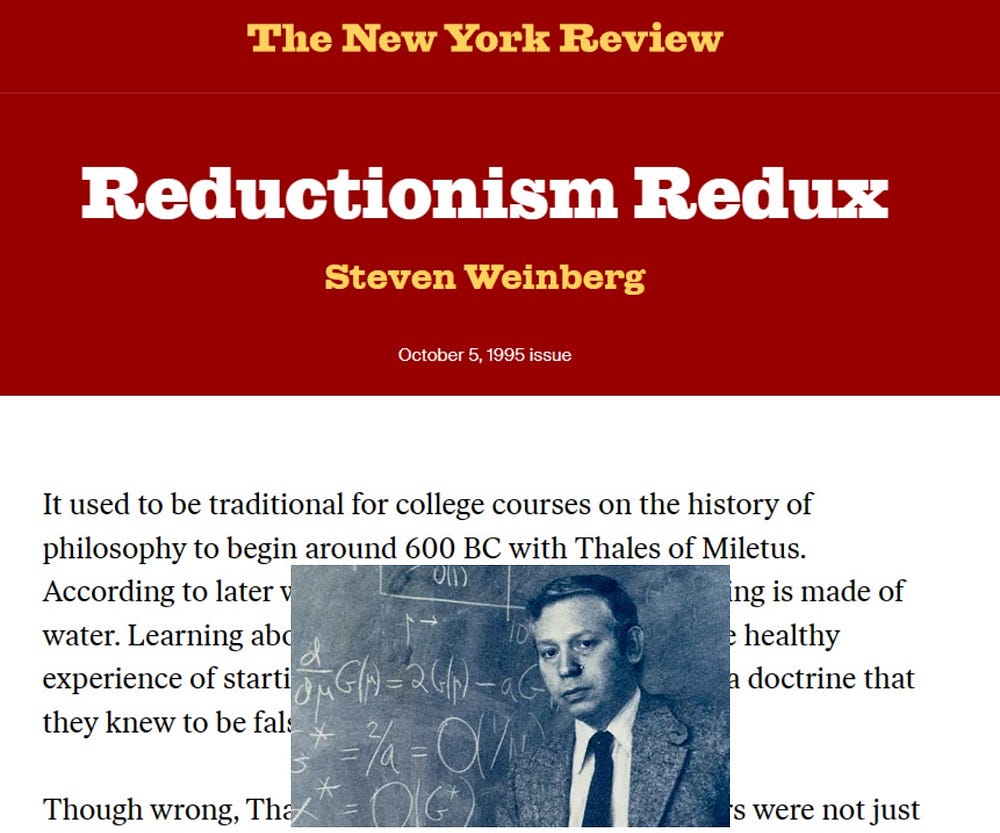Physicist Steven Weinberg was a rare example of a scientist who actually discussed reductionism in philosophical terms. That’s fairly strange because this is a contentious issue which is usually only discussed by philosophers and (relevantly enough) the critics of science. Weinberg’s central point was that physics — and perhaps much of science generally — has always been (at least in broad outline) reductionist. What’s more, many of those who criticise reductionism are actually criticising science itself. However, they artfully mask over that fact by overusing the word “reductionism” (as well as the words “materialism” and “scientism”).

In a YouTube video called ‘What is Reductionism?’, the theoretical physicist and science communicator Sabine Hossenfelder describes reductionism in the following way:
“Reductionism is, loosely speaking, the idea that you can understand things by taking them apart into smaller things.”
Hossenfelder adds: “This definition of ‘reductionism’ is not quite correct, but it’s not too far off.” (This is a hint at Steven Weinberg’s “petty reductionism”, as we shall see later).
Relevantly, Hossenfelder then tells us “how enormously important reductionism is for scientific understanding”.
Hossenfelder also plays down the role of philosophy when it comes to reductionism. Firstly, she tells us that a
“lot of people seem to think that reductionism is a philosophy, but it most definitely is not that”.
Instead, reduction is a “hypothesis about the properties of nature”. What’s more:
“It is the hypothesis that has so far been supported by every single experiment that has ever been done. I cannot think of any scientific fact that is better established than that the properties of the constituents of a system determine how the system works.”
[Is a kid a reductionist when he decides to take apart his trainset — into its constituent parts — in order to find out what’s wrong with it?]
Despite Hossenfelder’s downplaying of philosophy, it’s worth noting the fact that the theoretical physicist Steven Weinberg (1933–2021) himself is a rare example of a scientist who actually discussed reductionism in philosophical terms. Indeed, he freely admitted that this is primarily a philosophical issue — unlike Hossenfelder.
To repeat. For a physicist, Weinberg wrote a fair amount on the subject of reductionism. And that’s fairly strange because this is a subject that’s usually only discussed by philosophers and the critics of science, not by scientists themselves.
[Sabine Hossenfelder is very critical of philosophy. Or, at the very least, she tells us that she’s “not interested” in it (see here). That said, I believe that she’s toned down her view on this subject in the last couple of years. I suspect that this is largely due to the strong comebacks she’s received from both philosophers and scientists on the issue of philosophy and its relation to science.]
Steven Weinberg Defends Reductionism
Steven Weinberg was a self-described “reductionist”. Or, at the very least, he was a self-described “compromising reductionist”. In Weinberg’s own words:
“I don’t consider myself an uncompromising reductionist. I consider myself a compromising reductionist.”
Whatever kind of reductionist Weinberg was, many people have a serious problem with all types of (what they call) reductionism.
So all this depends on how Weinberg compromised and who he was compromising with.
Whatever the case is, self-styled “anti-reductionists” will argue that Weinberg’s following line contradicts his compromise:
“I would like to try to formulate in what way elementary particles physics is more fundamental than other areas of physics.”
However.
Saying that “particles physics is more fundamental than other areas of physics” isn’t automatically (or necessarily) a commitment to uncompromising reductionism — or, indeed, a commitment to any kind of reductionism. In theory, then, one can believe that particle physics is indeed fundamental, at the very same time as also being against reducing other sciences down to it. That is, particle physics may well be deemed to be fundamental, and yet the scientist who believes this may still (as it were) allow the other sciences their own (complete?) “autonomy” (see later section).
In Praise of Reductionism
Steven Weinberg’s central point (like Sabine Hossenfelder’s) is that nearly all physics — and perhaps much of science generally — has always been reductionist. Indeed, reductionism has been at the heart of physics since Isaac Newton — and even well before that. (Read the extract from Weinberg’s The New York Review article in the opening image.)
What’s more, many (i.e., not all) of those who criticise (what they call) reductionism are often actually criticising science itself. However, they often artfully mask over that fact by overusing the word “reductionism” (as well as the words “scientism” and “materialism”). Indeed, if Weinberg is correct and reductionism is at the heart of physics, then criticising reductionism is almost the same as criticising science — or at least the same as criticising most of physics. (Biology often gets a lot a flack for its reductionism too — see here.)
Added to all that is Weinberg’s idea that even when it comes to complexity, emergence and the autonomy of the other sciences (i.e., outside physics), the laws of physics and its equations still (to use a non-technical term) underpin such complexity, emergence and many of the other sciences.
In terms of detail, Weinberg makes a distinction between two different scientific strategies: “grand reductionism” and “petty reductionism”.
Grand and Petty Reductionism
Firstly, Steven Weinberg defines grand reductionism thus:
“Grand reductionism is what I have been talking about so far — the view that all of nature is the way it is (with certain qualifications about initial conditions and historical accidents) because of simple universal laws, to which all other laws may in some sense be reduced.”
As for “petty reductionism”:
“Petty reductionism is the much less interesting doctrine that things behave the way they do because of the properties of their constituents: for instance, a diamond is hard because of the carbon atoms of which it is composed can fit together neatly.”
Weinberg then sums of the distinction by adding that
“[g]rand and petty reductionism are often confused because much of the reductive progress in science has been in answering questions about what things are made of, but the one is very different from the other”.
Yet even Weinberg’s petty reductionism contains a large and obvious element of truth to it. That is, objects (or Weinberg’s “things”) do “behave the way they do because of the properties of their constituents” (as Sabine Hossenfelder stated in the introduction). However, few scientists would claim that a composite object (made of smaller things) could be entirely explained by — or reduced to - an individual object (or constituent part) of which it is made. Indeed, not many scientists would claim that a composite object is simply the sum of the individual things of which it is made (see ‘Mereology’). Nonetheless, it is still the case that the composite object does indeed behave the way it does — largely — because of the properties of its constituent parts. That is, if its constituents were different, then its overall behaviour would be different too.
All that said, adept philosophers could provide many convoluted thought experiments and arguments which may well demonstrate exceptions to this rule (i.e., the rule about the importance of an object’s constituents).
For example, such philosophers would argue that, in some cases at least, if you take away an individual constituent, then the composite object would still behave normally (or in its usual way). Indeed, on a functionalist account, even removing many individual constituents from a composite object may not (or will not) have a (big?) impact on the behaviour of that object. (This is obviously the case when one thinks in terms of removing, say, a few neurons from a brain or a couple of bricks from a house.)
However, the behaviour of a composite object would still be dependent on its constituents even if some — or many — of its constituents were either removed or substituted with other (material) things (as in functionalist accounts). That’s because this would simply mean that the new constituents would then need to be factored into the story of the composite object. That is, new constituents would then be the — partial - explanation of the behaviour of the composite object. Or if some — even many — constituent parts were removed, then there would still be constituents which haven't been removed. And then they would largely determine the behaviour of the composite object.
Thus, this line of reasoning means that the popular philosophical idea of multiple realizability (as in functionalism) doesn’t necessarily work against reductionism.
All that said, Weinberg still plays down petty reductionism when he continued by saying that “[p]etty reductionism is not worth a fierce defense”. He added:
“Sometimes things can be explained by studying their constituents — sometimes not.”
Albert Einstein and Grand Reductionism
Steven Weinberg offered us a concrete example of his distinction between grand reductionism and petty reductionism when he wrote the following words:
“When Einstein explained Newton’s theories of motion and gravitation, he was not committing petty reductionism. His explanation was not based on some theory about the constituents of anything, but rather on a new physical principle, the General Principle of Relativity.”
In the way Weinberg puts things, it may even be hard to decipher how a reductive strategy would work in the case of Einstein’s General Relativity. Yet, in theory at least, Einstein might well have used a reductive strategy. That is, motion and even gravitation could have, in principle, been explained in terms of a reduction of motion and gravitation to the objects which have mass and to the constituents (or geometry) of space. What’s more, even today gravity can be reduced (if not experimentally) to its (possible?) constituents — i.e., gravitons.
All that said, Einstein constructed his Relativity theories before anyone knew about the fine structure of spacetime (whether loops, foam or whatever) and gravitons. Indeed, all this knowledge might not have helped him anyway. That is, according to Weinberg, Einstein’s “principle” is painted as being purely mathematical and theoretical in nature. Put simply, because Einstein was a theoretical physicist (i.e., not an experimental or “hands-on” physicist), then the constituents of this and that didn’t really play much of a role in his General Relativity. That said, this may be too simplistic an opposition (i.e., as in the theory/experiment binary) to advance. After all, Einstein (to take just one example) had much to say about the constituent “parts” of electromagnetic waves — i.e., photons (see here).
In any case, Weinberg’s upshot is that Einstein reduced things to “simple universal laws”, not to the (physical) constituents of composite objects. However, one wonders (as already hinted at) if these two approaches can ever really exist in splendid isolation from one another — at least over long periods of scientific history.
Weinberg’s (Mild?) Reductionism About Chemistry
There’s a certain sense in which even some strong anti-reductionists would agree with Weinberg's (as it were) mild reductionism about chemistry. (Can reductionism ever be mild to the anti-reductionist?)
For example, Weinberg stated the following:
“[T]here are no principles of chemistry that simply stand on their own, without needing to be explained reductively from the properties of electrons and atomic nuclei.”
This position was once (seemingly?) backed up by Paul Dirac. Weinberg himself states the following:
“[Freeman Dyson] also cited the work of Schrödinger and Dirac on quantum mechanics in 1925 and 1927 as ‘triumphs of reductionism. Bewildering complexities of chemistry and physics were reduced to two lines of algebraic symbols’.”
In one respect, it’s true that Paul Dirac (1902–1984) put the quintessential (scientific) reductionist position (at least according to Murray Gell-Mann) in that his relativistic quantum-mechanical equation for the electron (of 1928) “explained most of physics and the whole of chemistry”.
Of course, the interpretation of what Dirac said himself is entirely dependent on what the word “explained” means in this context. In one sense, then, Dirac’s own position was simply factual. (Or, at the very least, the facts as he saw them.) That is, according to Gell-Mann (again), Dirac presciently realised that
“[a] great many of the phenomena of chemistry are governed largely by the behavior of the electrons as they interact with the nuclei and with one another through electromagnetic effects”.
In that limited sense, Dirac was right. However, if we take Dirac to have believed that literally everything about chemistry could by explained by his equation (or even by physics generally), then that would indeed be problematic.
Now take the physicist Murray Gell-Mann’s position.
Gell-Mann agreed with Dirac’s grand claim when he wrote the following:
“QED [quantum electrodynamics] does explain, in principle, a huge amount of chemistry. It is rigorously applicable to those problems in which the heavy nuclei can be approximated as fixed point particles carrying an electric charge.”
Indeed, Gell-Mann went further when he continued:
“In principle, a theoretical physicist using QED can calculate the behavior of any chemical system in which the detailed internal structure of atomic nuclei is not important.”
If we return to Weinberg.
The Complete Autonomy of All the Sciences?
From reading Steven Weinberg, all he means by saying that the special sciences “don’t stand on their own” is that such principles and laws (to use that non-technical word again) underpin chemistry. This isn’t an argument that everything within chemistry can be explained in terms of those principles, laws and equations. (If these three things can even be distinguished at all.) However, if it weren’t for the laws, principles and equations of physics, then chemistry wouldn’t stand at all. In a strong sense, then, this is obvious. What’s more, even some anti-reductionists would agree — if only if put in these mild terms.
All that said, what Weinberg stated next will be way more controversial and problematic to many anti-reductionists. Weinberg continued:
“[I]n the same way there are no principles of psychology that are freestanding, in the same sense that they do not need ultimately to be understood through the study of the human brain, which in turn must in the end be understood of the basis of physics and chemistry.”
This passage will displease — and even anger — anti-reductionists more than anything else quoted in this essay. After all, psychology is deemed to be autonomous because it’s essentially about human persons (or collections thereof), who are themselves meant to be autonomous. (See ‘Special sciences’.) Thus, any encroachment on psychology from, say, neuroscience, let alone from physics, is often deemed to be sacrilege. (The specialness of the special sciences was advanced by Jerry Fodor way back in 1974. See his paper ‘Special Sciences (or: The Disunity of Science’.)
Murray Gell-Mann goes even further than Steven Weinberg when he argued that psychology is “not yet sufficiently scientific”. What’s more, he went on to say that his
“preference would be to take [them] up in order to participate in the form of making them more scientific”.
All that said, what Weinberg himself argued (from both an anti-reductionist and a reductionist point of view) seems to be pretty harmless. That’s primarily because psychological principles do stand alone without needing to mention anything about physics (or the physics of the brain).
Yet here again Weinberg is talking about the laws, principles and equations of physics which (that word again) underpin “the human brain”, if not the science of psychology itself. (Most psychologists virtually ignore the human brain.)
Again, the principles of psychology don’t need to be understood through the “study of the human brain”, let alone on “the basics of physics and chemistry”. However, the brain is what it is because of the laws, principles and equations of physics. And psychology is what it is because of physical brains (as well as the interactions of such brains and their environments).
Despite all that, the theoretical physicist Sean Carroll often stresses the autonomy of the special sciences. (Jerry Fodor — again — stressed what he called “strong autonomy”.)
The Autonomy of the Special Sciences?
More particularly, Sean Carroll advances the autonomy of what he calls “emergent theories”. (This is an important part of his “poetic naturalism”.) Carroll writes:
“The emergent theory is autonomous [] it works by itself, without reference to other theories.”
Elsewhere, Carroll says that with strong emergence “all stories are autonomous, even incompatible”. Yet, in other places, Carroll also stresses emergent theories and their compatibility with fundamental theories. Indeed, Carroll actually hints at a lack of (complete?) autonomy when he says that “we might learn a little bit about higher levels by studying lower ones”. In addition, Steve Carroll (in a seminar) used the word “consistence” in reference to the fit between emergent and more basic theories.
So how can that consistency and compatibility — between two very different and supposedly autonomous theories — be established?
Carroll also argues that (some) emergent theories are accurate…
How is that accuracy established?
Does Carroll simply assume an accuracy that’s tacitly and essentially guaranteed by a more fundamental (or basic) theory? Thus, doesn’t Carroll himself limit the emergent theory’s supposed autonomy?
In opposition to Sean Carroll, it seems that Murray Gell-Mann didn’t believe in this (complete?) autonomy. That’s because he believed in both a “bottom-up method of building staircases between disciplines”, and a “top-down approach” as well. Yet if the higher-level disciplines were indeed truly autonomous, then why would they require either a “top-down” or a “bottom-up” method? Surely they could stand on their own two feet. Indeed, the fact that Gell-Mann even raised the question of both bottom-up and top-down approaches (or methods) means that he did indeed have a (to use his own words) “bias in what invites the charge of ‘reductionist’”. In other words, because Gell-Mann didn’t believe in the (complete?) autonomy of the special sciences, he could be classed as a reductionist — as he himself admitted. A non-reductionist, on the other hand, would say that the special sciences are completely (or genuinely) autonomous. Thus, they don’t need to account for themselves — at least not via physics.
(*) See my ‘Physicist Steven Weinberg Defended Reductionism: Mary Midgley and Gerald Edelman Attacked It’.
My flickr account and Twitter account.









